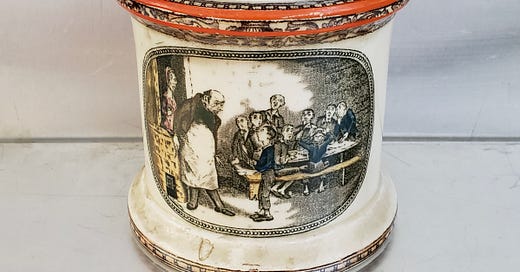THE DICKENS HUMIDOR
“Many afternoons and weekends, she’d bring home some old thing and tell us what it was…”
My mother grew up poor and without a father during the Depression. Her grandfather, Papa, was the only father she knew. He was a mean drunk. She loved him anyway. When she’d tell the story of how, when she was six, he threw a metal beer can at her head because she was talking too much, she’d laugh. To her it was a funny family story.
She was eight when Papa died, and his ghost stood at her bedside countless nights. She felt certain it was him because she could smell the smoke from his cigar.
Thanks to genetics and an abusive childhood, Mom grappled with mental disorders and addictions. But when we were very young, she was loving, a fun and capable mother. She loved to haunt garage sales, second-hand shops, antiques stores. Many afternoons and weekends, she’d bring home some old thing and tell my sisters and me what it was: a Depression glass bowl, a stone bedwarmer, a wire rug beater. Her family, going way back, had owned such things, she said.
One of her favorite finds was an antique tobacco humidor, made in England and hand-painted with scenes from Charles Dickens’s stories about poor people. Papa had had one something like it, she said. She removed the lid to show us the hole where a damp piece of sponge went to keep cigars fresh.
As we grew older, Mom’s addictions and increasing psychoses ravaged her brain and body. My sisters and I struggled through our teens, wanting only to move out and establish normal lives. When we finally left, we thought we’d escaped, but then Dad left, too, and Mom was ours to deal with. We weren’t qualified. After trying for too long to take care of her and keep her safe, we decided to place her permanently in skilled care.
The move meant narrowing down what she could take with her. She lobbied for each item she loved. The rug beater—this very rug beater—had been her mother’s back in the day, she insisted. The humidor—this humidor—had been her grandfather’s. “Maybe it’s just like the one he had, Mom,” I said, trying to placate her, but, no, it had been Papa’s, goddammit! She could become violent now, and reality wasn’t even on the table.
She died young, at 57, when I was 30. My sisters and I sorted through her few remaining belongings, dividing up her beloved antiques. In our grief, we kept too many things. She’d raised us to value family and now we couldn’t ignore it, not even her appropriated facsimiles of it.
Thirty years later, the tobacco humidor is still in my china hutch. It’s unusual and kind of lovely, but that’s not why I keep it. It doesn’t remind me of her, exactly. I guess it reminds me that she loved her grandfather without hesitation, as mean as he was, and as painful as their relationship could be.
—Jennie Shortridge
Jennie Shortridge, author of five bestselling novels, including Love Water Memory, is currently working on a memoir.






